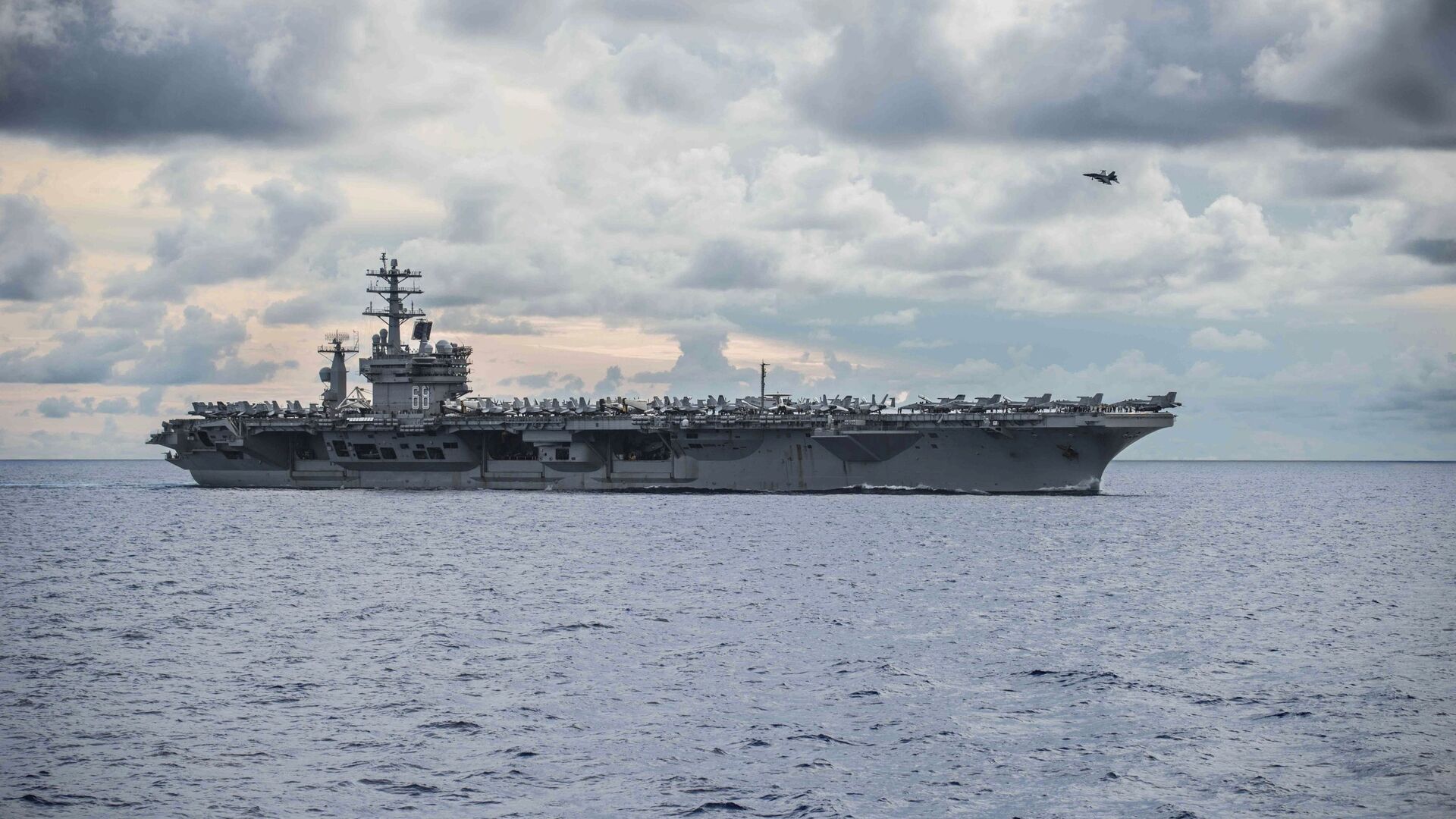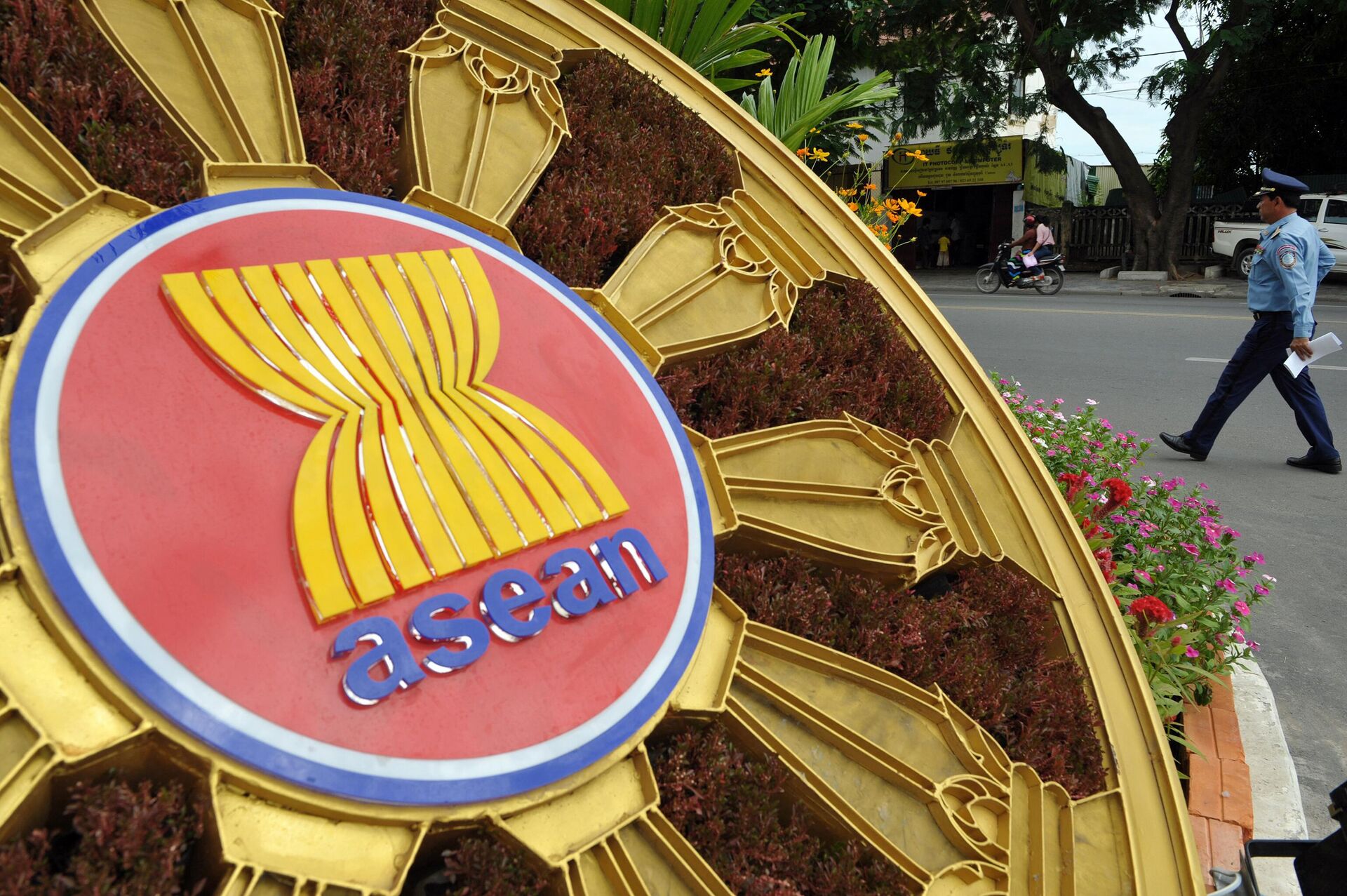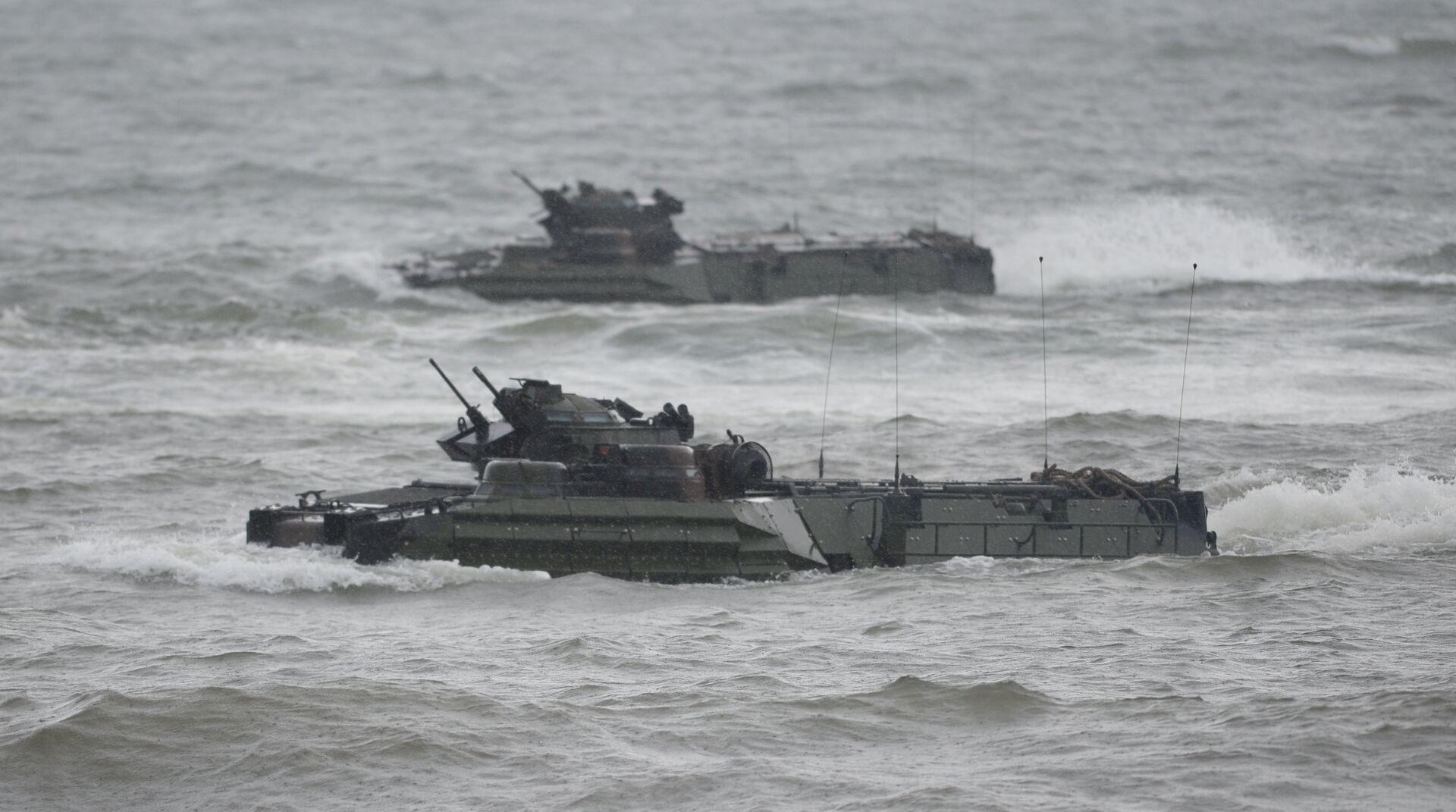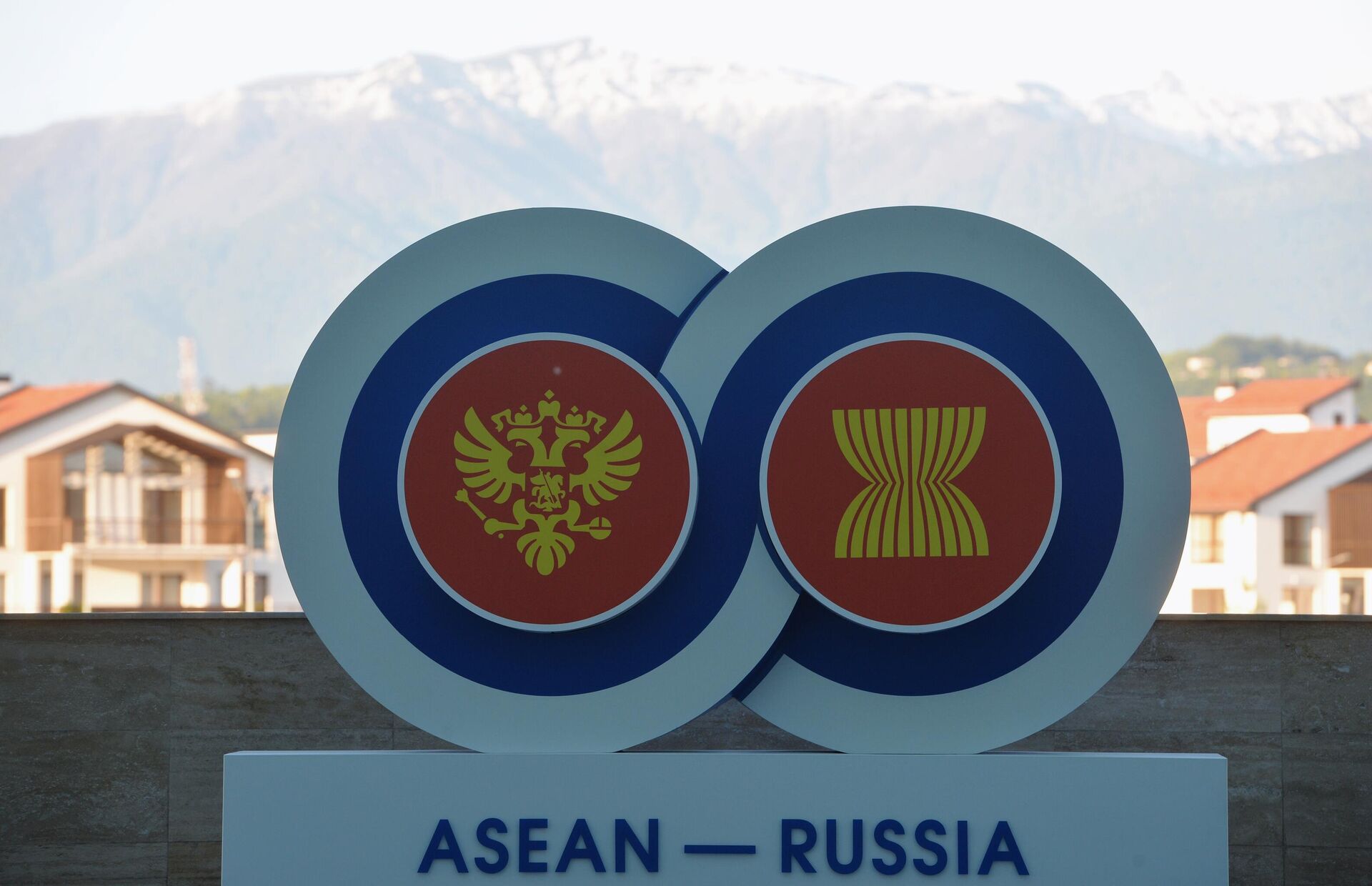Most Southeast Asian Nations Oppose NATO's Expansion to the Region, Russian Envoy to ASEAN Says

© AP Photo / Aviation Boatswain's Mate (Handling) 3rd Class Kimani J. Wint
Subscribe
As Indonesia concluded its G20 presidency on 16 November, Jakarta has assumed leadership in another major political and economic forum by becoming the 2023 ASEAN chair under the theme “ASEAN Matters: Epicentrum of Growth.”
Sputnik correspondent Denis Bolotsky sat down with the Ambassador of the Russian Federation to ASEAN Alexander Ivanov to discuss Indonesia's role in global and regional organizations, ASEAN’s current priorities and its cooperation with Russia, as well as the balance of the world’s superpowers in Southeast Asia.
Sputnik: Indonesia has the chance to lead major global and regional forums this year and over the next few years. To what extent do you think the country's goals in the G20 differ from those Indonesia will pursue as the Chair of ASEAN? What should we expect from the year of Jakarta's Chairmanship?
Alexander Ivanov: First, Indonesia is a very influential country, not only in the region but also in the world. It is the largest country in ASEAN. It is also the largest Muslim country in the world in terms of population. It continues to develop very dynamically. It is expected that the growth rate of its economy this year will exceed 5%. For us it is also important that we have established friendly, good relations, which continue to develop in all areas.
We expect Indonesia to effectively chair ASEAN and the ASEAN-led mechanisms, including the East Asia Summit (EAS), the ASEAN Regional Forum and the ASEAN Defense Ministers’ Meeting-Plus next year. Of course, Indonesia's Chairmanship will not be easy. Just like its current G20 presidency. Why not easy? For a number of reasons. There are growing geopolitical tensions in the world and frantic attempts of the United States and their allies to consolidate US hegemony in the world. We also witness attacks not only on Russia, but also on China.
In addition, not everything is smooth within ASEAN itself, and it will complicate the Indonesian presidency even more. First of all, there is the Myanmar problem. Unfortunately, there is no complete consensus among the 10 ASEAN Member States on how to handle it. Nevertheless, we are of the view that ASEAN should play the key role in resolving the crisis in Myanmar and we strongly support ASEAN’s Five-Point Consensus.

A Cambodian police officer (R) walks past the ASEAN logo in front of the Peace Palace during the 45th Association of Southeast Asian Nations (ASEAN) Foreign Ministers' Meeting (AMM) in Phnom Penh on July 8, 2012. Efforts to ease tensions in the South China Sea will dominate this week's Asian security dialogue in Cambodia, analysts say, while the US will be at pains to stress it seeks cooperation, not rivalry, with China.
© AFP 2023 / TANG CHHIN SOTHY
Undoubtedly, we will cooperate with Indonesia as the ASEAN Chair on all international issues. When it comes to the Ukrainian crisis, Indonesia's position is balanced and neutral. Indonesia does not succumb to the most powerful and unprecedented pressure from Western countries, especially the US, to exclude Russia from the G20, as well as from all regional cooperation mechanisms with ASEAN in their center. The Westerners have gone all-in and are trying to dictate their interests to ASEAN and its Chair.
Sputnik: Since you mentioned the East Asia Summit. What was the outcome of the recent summit in Phnom Penh? Did Moscow manage to make its position clear? What is your assessment of the results?
Alexander Ivanov: The East Asia Summit includes all key players in the Asia-Pacific region. Russia joined the EAS in 2010, although our application was submitted back in 2005 when this mechanism was established. Our President Vladimir Putin took part in the
1st EAS Summit in Kuala Lumpur in 2005 as a special guest of the Malaysian Chair. This year's 17th EAS was characterized primarily by the confrontational stance of the United States and its allies, namely Australia, Japan, South Korea, and New Zealand, towards Russia.
1st EAS Summit in Kuala Lumpur in 2005 as a special guest of the Malaysian Chair. This year's 17th EAS was characterized primarily by the confrontational stance of the United States and its allies, namely Australia, Japan, South Korea, and New Zealand, towards Russia.
In fact, they tried to turn this ASEAN-led mechanism into an anti-Russia tool, thus reducing its effectiveness as a platform for mutually beneficial practical cooperation in the region. This became even more obvious during the preparations for the summit. Three draft statements were put forward for the adoption by the leaders.
One of them was the Russian document aimed at supporting the volunteer movement in the context of the COVID-19 and in addressing its consequences. It is well known that volunteers in Russia, ASEAN countries and other EAS participating states have been playing an important role in overcoming the current pandemic. It was a purely action-oriented proposal, not politicized at all. Actually it not only contained the idea of supporting volunteer organizations in different countries, but was also aimed at furthering their interaction. In particular, we proposed to establish a kind of volunteer movement network within the EAS.

US marines Amphibious Assault vehicles (AAV) manoeuver on rough seas during a beach landing, as part of the Philippines-US amphibious landing exercise (PHIBLEX) at a naval training base facing South China sea in San Antonio town, Zambales province, north of Manila on October 7, 2016
© AFP 2023 / TED ALJIBE
In addition, China put forward a draft leaders’ statement on energy cooperation, which is now crucial for all countries in the world. Russia co-sponsored it. Finally the third document was jointly proposed by the United States, Australia, and South Korea. It focused on strengthening the role of women in economy. Given the concrete and practical nature of all three drafts, we initially said that we were ready to work on them in a constructive way, provided, of course, that our Western colleagues did not politicize them.
Nevertheless, the United States and its allies refused to heed our appeals. The Westerners constantly threw politicized paragraphs and wordings condemning the so-called "Russian aggression in Ukraine" into almost every draft. Meanwhile ASEAN took a very constructive stance on that issue. In fact, our ASEAN partners shared our view that the politicization of leaders' documents, especially those devoted to practical cooperation, was inadmissible. Until the very last moment, literally on the eve of the summit, the EAS Ambassadors carried on drafting all three proposed outcome documents in Phnom Penh.
Unfortunately, a consensus was not reached, due to the confrontational line of the US and its allies. In this regard, we stated that its true goal was to pervert the very essence of ASEAN-led mechanisms aimed at cooperation rather than confrontation. We emphasized that those actions showed that US and its satellites’ assurances of supporting the central role of ASEAN in the region are meaningless.
These are empty words. In fact, their actions are targeted at making these regional cooperation platforms ineffective. It is contrasted by the efforts of the US and its allies to create narrow blocs such as Quad, AUKUS, AUKUS Plus, alternative to existing ASEAN-led mechanisms. This is the true meaning of these efforts of the West.
Sputnik: How great is the threat from such blocs to the countries of Southeast Asia? And this interference in the processes in the region by NATO and the United States, how do the ASEAN countries perceive the actions of Washington and Brussels?
Alexander Ivanov: The ASEAN countries, for the most part, perceive these efforts of Washington negatively. In particular, Indonesia, Malaysia, and some other ASEAN countries made statements on the issue. They see what these steps taken by Washington and its allies in the region are aimed at. They understand the consequences of NATO's advance to Asia and the threat it poses to peace and stability in the region.
Of course, the opinions of ASEAN countries differ somewhat in tone and in the degree of criticism but in general, the attitude of ASEAN Member States is negative. Coming back to the 17th EAS. I should say that the Cambodian Chairmanship made a last-ditch effort at the very last moment to salvage three drafts of the leaders' documents. Late in the evening of November 12 the Cambodians sent out their drafts of the three documents, in which all confrontational phrases and paragraphs were deleted.
All red lines of Russia were taken into account. But the Western countries, led by the United States, sent their objections to the Cambodian Chair, thus blocking the adoption of the three leaders' statements. The Cambodian mission had no choice but to make its own Chairman's Statement comprising all three proposed outcome documents. It highlighted just the practical aspects of cooperation on all three topics without politicization or confrontation. Therefore, the Cambodian Chairmanship did everything to save the credibility of this ASEAN-led mechanism. We are grateful to them for that.
Sputnik: Can we say that by rejecting US amendments, ASEAN and Cambodia have shown the true strength and independence of their foreign policy aspirations?
Alexander Ivanov: Undoubtedly, they did not succumb to threats, blackmail, and direct pressure from the United States and its allies. In fact, the diplomatic battlefield for the preparation and holding of the East Asia Summit was retained by Russia and the ASEAN countries.




